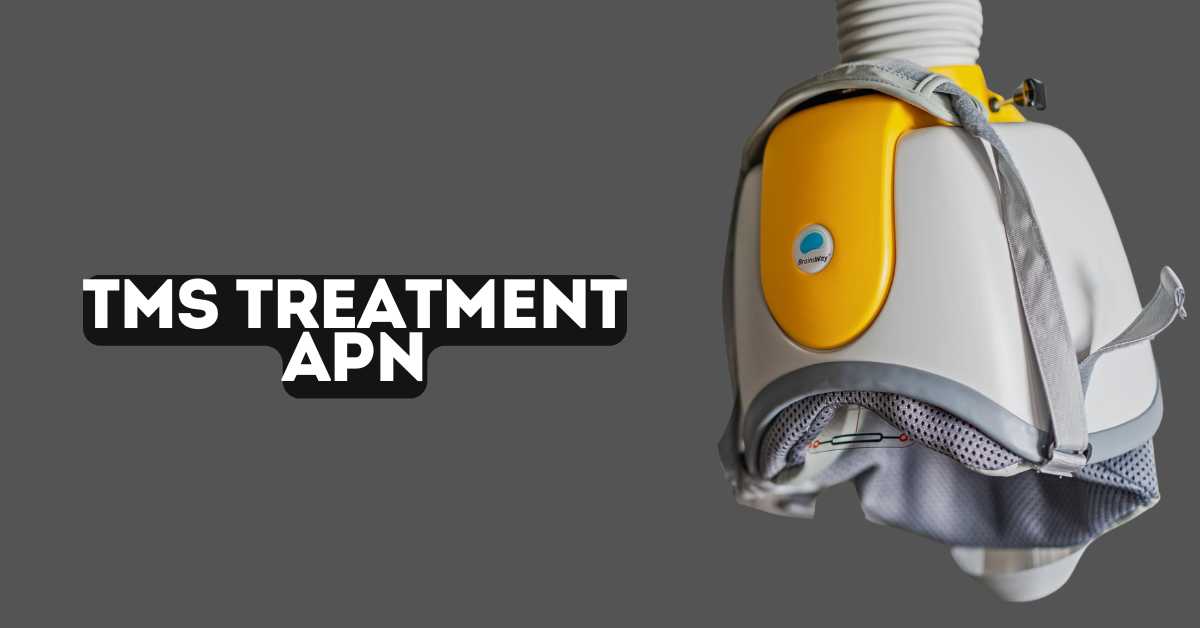Transcranial Magnetic Stimulation TMS Treatment APN has emerged as a groundbreaking approach to addressing various mental health conditions, offering a non-invasive and innovative solution for those who have not found relief with traditional therapies. This article will explore treatment APNs in detail, specifically focusing on their role in advanced practice nursing (APN). We will delve into the science behind TMS, its applications, benefits, and how APNs can uniquely utilize this technology to improve patient outcomes.
What is TMS Treatment?
TMS, or Transcranial Magnetic Stimulation, is a medical treatment that uses magnetic fields to stimulate nerve cells in the brain. It is primarily used to treat depression, especially in patients who have not responded to other forms of treatment like medication or psychotherapy.
The Science Behind TMS
The TMS procedure involves placing an electromagnetic coil against the patient’s scalp, near the forehead. The coil generates magnetic pulses that pass through the skull and into the brain, where they induce small electrical currents. These currents stimulate nerve cells in the region of the brain involved in mood control and depression. By targeting specific areas, TMS can help normalize the brain’s activity, leading to improved mood and cognitive function.
Key Benefits of TMS Treatment APN
- Non-Invasive: Unlike electroconvulsive therapy (ECT), TMS does not require anesthesia or induce seizures, making it a safer option for many patients.
- Minimal Side Effects: Common side effects are mild and include headache or discomfort at the treatment site, which typically resolves after a few sessions.
- No Systemic Effects: Since TMS does not involve medication, it avoids systemic side effects like weight gain or sexual dysfunction.
ALSO READ: Bluefire Wilderness Therapy: A Program for Troubled Youth
The Role of APNs in TMS Treatment
Advanced Practice Nurses (APNs) play a crucial role in the administration and management of TMS treatment. With their advanced clinical training and patient-centered approach, APNs are well-suited to lead TMS programs and provide holistic care.
APNs as Leaders in Mental Health Care
APNs can diagnose and treat medical conditions, prescribe medications, and develop comprehensive care plans. In the context of TMS treatment, APNs are equipped to:
- Conduct Initial Assessments: Evaluate the patient’s medical history, current mental health status, and suitability for TMS Treatment APN.
- Develop Treatment Plans: Customize TMS protocols based on individual patient needs and monitor progress throughout the treatment course.
- Provide Education and Support: Educate patients and families about TMS, its benefits, and what to expect during treatment.
APN-Led TMS Programs
Incorporating TMS into practice allows APNs to expand their therapeutic offerings and provide cutting-edge care. APN-led TMS programs are characterized by:
- Patient-Centric Care: Emphasizing a holistic approach that addresses the physical, emotional, and social aspects of mental health.
- Multidisciplinary Collaboration: Working alongside psychiatrists, psychologists, and other healthcare professionals to ensure comprehensive care.
- Continuous Innovation: Staying updated with the latest research and advancements in TMS technology to optimize treatment outcomes.
Applications of TMS Treatment
While TMS Treatment APN is primarily used for depression, its applications are expanding to other mental health conditions and neurological disorders.
TMS for Depression
Major Depressive Disorder (MDD) is the most common indication for TMS treatment. Studies have shown that TMS can significantly reduce symptoms of depression and improve the quality of life for patients who have not responded to other treatments.
Emerging Applications
- Anxiety Disorders: They are exploring TMS as a treatment for various anxiety disorders, including generalized anxiety disorder (GAD) and post-traumatic stress disorder (PTSD).
- Obsessive-Compulsive Disorder (OCD): The FDA has approved TMS as an adjunct treatment for OCD, offering hope for patients with treatment-resistant symptoms.
- Chronic Pain: Research is ongoing to determine the efficacy of TMS in managing chronic pain conditions like fibromyalgia and neuropathic pain.
The Future of TMS Treatment APN
The future of TMS treatment is promising, with ongoing research aimed at expanding its applications and improving its efficacy.
Advances in Technology
Technological advancements are enhancing the precision and effectiveness of TMS. Innovations include:
- Personalized TMS Protocols: Utilizing advanced imaging techniques to tailor TMS treatment to the individual’s unique brain structure and activity patterns.
- Enhanced Coil Designs: Developing coils that target deeper brain structures, potentially expanding the range of treatable conditions.
Integrating TMS Treatment APN into Holistic Care
As TMS becomes more widely accepted, integrating it into holistic care models will be crucial. This involves:
- Combining Therapies: Using TMS in conjunction with psychotherapy, medication, and lifestyle interventions to provide comprehensive treatment.
- Patient Empowerment: Educating patients about TMS and involving them in treatment decisions to foster a collaborative and empowering care environment.
SEE ALSO: Understanding Esfeet: Causes, Treatment, and Prevention
Challenges and Considerations in TMS Treatment APN
While TMS offers numerous benefits, there are challenges and considerations that must be addressed to maximize its potential.
Accessibility and Cost
One of the primary barriers to TMS treatment is accessibility and cost. Many patients may not have access to TMS facilities, and the treatment can be expensive. Efforts are needed to do the following.
- Increase Availability: Expand the number of TMS treatment centers, especially in underserved areas.
- Insurance Coverage: Advocate for broader insurance coverage to make TMS more affordable for patients.
Ensuring Efficacy and Safety
Maintaining high standards of efficacy and safety is crucial in TMS treatment. This involves:
- Standardizing Protocols: Developing standardized treatment protocols to ensure consistent and effective care.
- Monitoring Side Effects: Closely monitoring patients for side effects and adjusting treatment as necessary to ensure safety.
Ethical Considerations
Ethical considerations in TMS treatment include:
- Informed Consent: Ensuring that patients fully understand the potential risks and benefits of TMS before starting treatment.
- Equitable Access: Addressing disparities in access to TMS treatment and ensuring that all patients have the opportunity to benefit from this technology.
Conclusion
TMS treatment, especially when integrated into Advanced Practice Nursing, offers a transformative approach to mental health care. By harnessing the power of magnetic pulses, TMS provides a non-invasive, effective, and innovative solution for patients with treatment-resistant conditions. As the field of TMS continues to evolve, APNs will play a pivotal role in advancing this technology and improving the lives of countless individuals.
The future of TMS treatment is bright, with the potential to expand its applications, enhance patient outcomes, and transform the landscape of mental health care. By addressing challenges and embracing advancements, TMS can become an integral part of holistic, patient-centered care.









